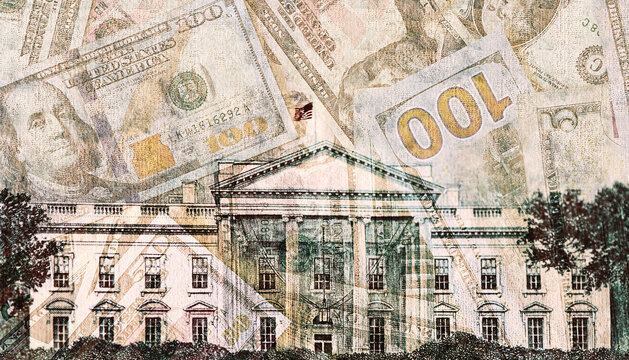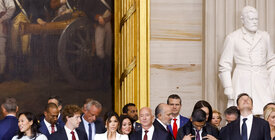
Wealthy Donors See Returns in House Budget Overhaul
The bill’s tax benefits for the ultra-rich present a familiar story of donors’ outsize influence.

Part of
As conflicts of interest and other corruption scandals in the federal government make
headlines, a more familiar story of money in politics is playing out in Congress — donating to House members pays.
Last month, the House passed its annual budget bill, a large package of policy changes
that many observers have noted will disproportionately benefit wealthier Americans while cutting benefits for the poorest. Taxation and government benefits have long been areas where the biggest political donors have an outsized impact on policy, and the bill is certainly no exception.
The bill extends a number of the priorities that made their way into the 2017 budget, which cut some taxes for middle- and working-class Americans but overall was heavily skewed towards high-income earners. That legislation passed in part because some of the biggest GOP donors made clear to members of Congress that continuing financial support was contingent on its approval.
The 2025 package maintains lowered income tax rates for the wealthiest brackets, shields an additional million dollars in wealth from the estate tax (which only applies to multimillionaires), and increases the size of the pass-through deduction, a tax break for certain business owners that disproportionately benefits the wealthy.
Despite President Trump’s stated opposition, the bill does not close the carried interest loophole, a tax break that favors hedge fund managers.
The bill does include certain populist promises, such as tax cuts for tips and overtime, as well as a modest expansion of the Child Tax Credit. But the impact of these changes is outweighed by an overwhelming slant in favor of the wealthiest Americans. This favoritism is most visible in one of the bill’s most talked-about components: To offset a portion of the revenue lost through tax cuts, the bill would cut food stamps and Medicaid.
As with the carried-interest loophole, some voices in the Republican coalition have spoken out against Medicaid cuts. Democratic pollsters have found that cuts to these programs pose huge electoral liabilities for the GOP, but the House passed the bill nonetheless. There are various reasons why a legislator might do something broadly unpopular, but the extent to which our loosely regulated campaign finance system empowers wealthy interests is key.
This dynamic is certainly not limited to one party. Recently, for instance, Democrats and Republicans have courted major donors from the crypto industry with promises of favorable regulation.
At a human level, big donors are simply the people with whom many elected leaders must talk more frequently, and that impacts lawmakers’ views. As one member of the House said, “Both parties have told newly elected members of the Congress that they should spend 30 hours a week in the Republican and Democratic call centers.” Beyond simply helping elect certain candidates, donors buy access to make the case for the policies they want.
Running for office itself also poses significant financial barriers — not only must a candidate fundraise off their networks, but they must afford to live while campaigning, too. As a result, elected officials tend to be wealthier themselves and associate with the donor class.
The result is that Americans who use food stamps or rely on Medicaid possess much less political power than those who are subject to the inheritance tax — and that plays out in legislation. Research consistently shows that working-class Americans’ policy preferences correlate less with policy outcomes than those of high-income Americans, despite the former being far more numerous.
This imbalance is not new. Political scientist E.E. Schattschneider wrote in 1960 that in American democracy, “The flaw in the pluralist heaven is that the heavenly chorus sings with a strong upper-class accent.” We don’t lack participatory political structures like elections and legislatures, nor do we lack diversity of political thought. But the policies our system yields are warped by wealth.
Schattschneider spoke to the fundamental tension of participatory institutions coexisting with economic inequality — a tension that today comes to the forefront in campaign finance law.
Our courts and legislatures have largely deregulated campaign finance, making the pluralist heaven’s chorus more inclined to sing about carried-interest loopholes and Medicaid cuts. The goal of reform should be to ensure that the interests of all Americans are represented in federal policy, regardless of how much money they have.
More from the Corruption in America collection
-
The Emoluments Clauses, Explained
The framers wanted to insulate the president and federal officials from corrupting influences, but a new law is needed to ensure effective enforcement. -
Who Benefits from Trump’s Move to Shut Down Consumer Financial Protection Bureau?
The decision to shutter the CFPB looks to be another example of the donor class holding sway over Washington. -
Uncovering Conflicts of Interest and Self-Dealing in the Executive Branch
The new administration could use federal contracts, tariffs, regulations, taxes, and other levers of government to benefit campaign donors, high-level officials, and the president himself.




